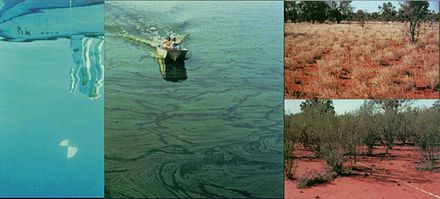
Back المرونة البيئية Arabic Ekolohikal na kasarigan BCL Resiliència (ecologia) Catalan Gwytnwch ecolegol Welsh Ecological resilience DAG Resilienz (Ökosystem) German Resiliencia (ecología) Spanish تابآوری بومشناختی Persian Résilience (écologie) French Ikike nguzogide nke gburugburu ebe obibi IG

In ecology, resilience is the capacity of an ecosystem to respond to a perturbation or disturbance by resisting damage and subsequently recovering. Such perturbations and disturbances can include stochastic events such as fires, flooding, windstorms, insect population explosions, and human activities such as deforestation, fracking of the ground for oil extraction, pesticide sprayed in soil, and the introduction of exotic plant or animal species. Disturbances of sufficient magnitude or duration can profoundly affect an ecosystem and may force an ecosystem to reach a threshold beyond which a different regime of processes and structures predominates.[2] When such thresholds are associated with a critical or bifurcation point, these regime shifts may also be referred to as critical transitions.[3]
Human activities that adversely affect ecological resilience such as reduction of biodiversity, exploitation of natural resources, pollution, land use, and anthropogenic climate change are increasingly causing regime shifts in ecosystems, often to less desirable and degraded conditions.[2][4] Interdisciplinary discourse on resilience now includes consideration of the interactions of humans and ecosystems via socio-ecological systems, and the need for shift from the maximum sustainable yield paradigm to environmental resource management and ecosystem management, which aim to build ecological resilience through "resilience analysis, adaptive resource management, and adaptive governance".[2][5] Ecological resilience has inspired other fields and continues to challenge the way they interpret resilience, e.g. supply chain resilience.
- ^ Cite error: The named reference
Folke, Carpenter et al 2002was invoked but never defined (see the help page). - ^ a b c Cite error: The named reference
Folke, Carpenter et al 2004was invoked but never defined (see the help page). - ^ Scheffer, Marten (26 July 2009). Critical transitions in nature and society. Princeton University Press. ISBN 978-0691122045.
- ^ Cite error: The named reference
Peterson et al 1998was invoked but never defined (see the help page). - ^ Cite error: The named reference
Walker, Holling et al 2004was invoked but never defined (see the help page).
© MMXXIII Rich X Search. We shall prevail. All rights reserved. Rich X Search